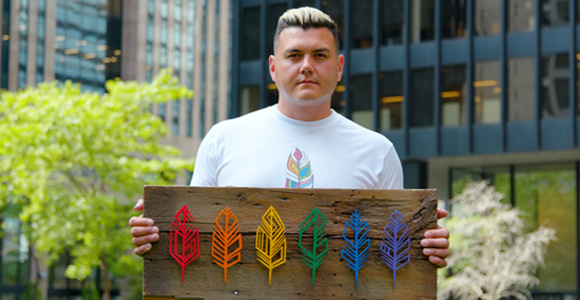Jan 31, 2023
Michele Romanow strives to 'show up and take responsibility' after Clearco layoffs
, BNN Bloomberg
Founders will need a new level of discipline to ride through this economic curve: Michele Romanow
Just days after stepping down as CEO of Clearco, founder Michele Romanow is still at the Toronto office every day and doesn’t have much time for extra hobbies. As she puts it, she remains “incredibly active” in the e-commerce company that went from being valued at $2 billion two years ago, to laying off more than half its workforce and exiting international markets in the last six months.
The Canadian entrepreneur recognizable for her role on on CBC television show Dragons’ Den is now an executive co-chair and board member at Clearco, which has shifted from “growth mode” to a focus on profitability amid a downturn in the technology sector that’s led to tens of thousands of layoffs in recent months.
For Romanow, it’s important “to show up and take responsibility” during tough times, even if “founders don't control macroeconomic conditions” like Russia’s attack on Ukraine or rising interest rates.
“The reality is when you sign up for this job, it's kind of all your fault,” she said in an interview with BNN Bloomberg.
That’s meant sleepless nights and difficult goodbyes to colleagues after making the “devastating” decision to pursue a further round of layoffs, slashing the workforce by another quarter this month. Last summer, Clearco cut 125 positions in July and another 60 jobs in August.
“It's the hardest move for a leader,” she said. “Every time you have to fire a single person or multiple people in a layoff, you don't sleep as a founder, and I think that's a good thing. I think that makes you human.”
Romanow said she and company co-founder Andrew D’Souza have opened their networks to help former employees land new jobs, while trying to be generous with severance.
Looking forward, Romanow said she is focused on what’s best for Clearco and its remaining employees as the “COVID boom” in tech wanes and companies across the sector adjust. Big names like Canada’s Shopify Inc., Google, Microsoft Corp., International Business Machines Corp. and Facebook parent company Meta Platforms, Inc. have also cut thousands of jobs in the past several months.
“It's fun to build when the sun is out…(but) real leaders are made when it starts raining,” Romanow said. “You have to figure out how to fix and pivot and adjust a business for the economic climate you're in.”
NEW ECONOMIC REALITY
Romanow got the idea for Clearco from Dragons’ Den, where she and other business leaders hear pitches from Canadian entrepreneurs. The company, founded in 2015, loans money to businesses based on revenue rather than assets. It does not require personal guarantees, so people do not have to put their mortgages on the line to start businesses.
E-commerce and technology companies generally benefited from a growing customer base and more demand for online services during the pandemic as people were forced to stay home. Romanow contends a recession that was held back due to government supports early in the pandemic “had to catch up with itself” eventually.
Clearco “hired too quickly” in the past few years, Romanow said, as the company built new projects and expanded into 13 countries, where credit markets eventually turned. The combination of events ultimately led to it scaling back over the last year, pulling the plug on some projects and cutting its workforce to 140 this month, down from 500 early in 2022. Romanow also stepped down as CEO, a year after taking on the role.
“The goal is what the market is demanding, which is that every tech company become profitable,” she said. “We’re very focused on our path to profitability, the capital, the structures and our funds that we need to do that, and being as efficient as possible.”
Romanow grew up in a family of entrepreneurs and started her first business as a post-secondary student – and she has faced the need to pivot in a changing economy before. She recalled starting an East Coast caviar fishery as one of her earliest ventures, only to realize, come 2008, that she had “started a business with the world's most unnecessary luxury product” during a recession.
At this chapter in Clearco’s story, she decided the time was right to move into a different kind of leadership role where she now focuses on fundraising, relationships with partners and directing strategy, while new CEO Andrew Curtis takes the helm.
“For me, this is really about not having an ego. I care about the success of the company and that's it,” Romanow said.
She sees opportunities for Clearco despite tightening economic conditions. Entrepreneurs have shown more interest in Clearco’s products in the last six months, Romanow said, as venture capital has become less available amid economic headwinds and businesses owners seek other funding options.
INNOVATION BOOM POTENTIAL
Romanow said she also sees potential for an innovation boom as highly skilled tech workers are laid off in droves, similar to the period of business creativity she saw after the 2008 recession, when she started a competitor to Groupon and other now-ubiquitous companies like Instagram, Airbnb, Inc. and Uber Technologies, Inc. came to be.
Some laid off Clearco employees have already started new businesses, Romanow said, hinting at the beginnings of a potential silver lining to the distressing period for the technology sector.
“I think what's going to happen is we're going to see a lot of new businesses being created, which is a really positive thing, although this is going to be a tough period of time,” she said.
As for herself, Romanow said she is staying focused on her company’s goals before jumping headfirst into another business idea.
“I think once an entrepreneur, always an entrepreneur, but right now my focus is Clearco,” she said. ”This is a tough environment and I need to remain focused on getting through this next chapter.”






